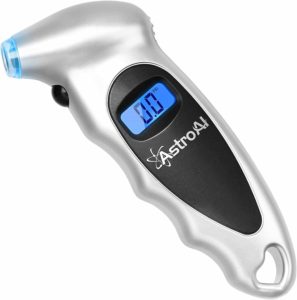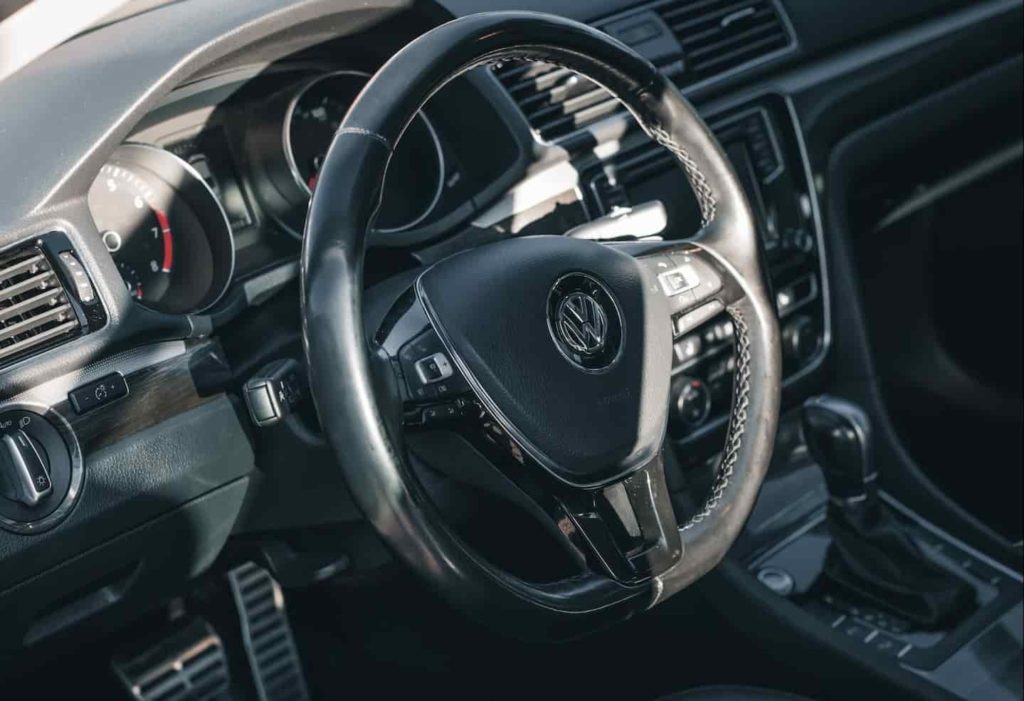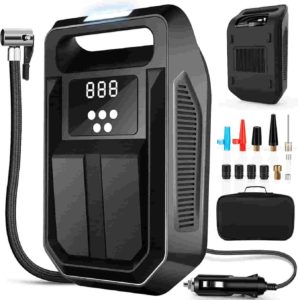Volkswagen Passat TPMS
The indirect Tire Pressure Monitoring System (TPMS) in the Volkswagen Passat is a crucial safety component that keeps track of tire pressure levels without requiring sensors inside the tires. Monitoring tire pressure allows the vehicle to sustain peak performance, handling, and fuel economy. Additionally, the TPMS helps avert potential tire-related problems and accidents by warning the driver if the tire pressure falls below the advised level with a tire pressure warning light on the dashboard!
How Does the Volkswagen Passat TPMS Work?
Wheel speed monitoring: Indirect TPMS relies on the Anti-lock Brake System (ABS) sensors to gauge each wheel’s rotational speed. (specifically wheel speed sensors)
Data collection and analysis: The vehicle’s computer collects data from the ABS sensors to analyze and compare the rotational speed of each wheel.
Rolling circumference calculation: The computer system calculates the rolling circumference of each tire based on the wheel speed data.
Detection of deviations: Volkswagen TPMS identifies any discrepancies or changes in the rolling circumference of the tires, which may indicate changes in tire pressure.
Temperature compensation: The system accounts for temperature fluctuations and their impact on tire pressure to avoid false alerts. (This claim may only be true for brand new models)
Algorithm application: Volkswagen TPMS uses algorithms to compare tire speed and rolling circumference, determining whether the deviations are within acceptable limits.
Establishing tire pressure status: The system determines if the deviations in rolling circumference are consistent with under-inflated or over-inflated tires.
Warning activation: If the system detects a significant deviation in tire pressure, it triggers a warning light on the dashboard to alert the driver.
Continuous monitoring: VW TPMS constantly monitors tire pressure conditions while the vehicle is in motion, ensuring ongoing safety and performance.
Understanding Tire Pressure
Does Weather Affect Tire Pressure?
In a Volkswagen Passat the weather can significantly impact tire pressure. The atmospheric temperature is a key determinant of this phenomenon. Tires contain air, and air like all gasses follows the Ideal Gas Law. This principle states that the pressure of a gas varies directly with temperature and volume when kept at a constant amount. So, during colder months or days the temperature drop leads to a contraction of air inside the tires, thereby decreasing the tire pressure. In hotter weather the air inside the tires expands leading to an increase in air pressure. Regularly checking and adjusting your VW Passat’s tire pressure according to the weather conditions can significantly optimize the vehicle’s performance and safety.
How to Check and Adjust Tire Pressure
Checking tire pressure in a Volkswagen Passat, or any other vehicle, can be done in a few simple steps:
Purchase a Tire Pressure Gauge: They come in digital and analog (dial) versions. Both work fine, but digital gauges can be easier to read.
Wait for the Tires to Cool Down: Tire pressure should ideally be checked when the tires are ‘cold,’ meaning they haven’t been driven on for at least three hours. This is because driving heats up the tires and can inflate the pressure reading.
Find the Recommended Tire Pressure: Check your Passat’s user manual or look for a sticker on the inside of the driver-side door for the recommended tire pressure. This is typically given in pounds per square inch (psi).
Remove the Valve Cap: This is the small cap on your tire’s valve stem, the small protruding piece where air can be added or released. Turn it counterclockwise to remove.
Attach the Tire Pressure Gauge: Place the gauge onto the valve stem and press down quickly and firmly. If you’re doing it correctly you shouldn’t hear a hiss of air escaping. The gauge will display the tire’s current pressure.
Read the Gauge: Check the reading on the gauge, comparing it to the recommended pressure. If it’s too high, release some air from the tire. If it’s too low add air.
Adjust the Pressure if Needed: If the pressure is too high press the gauge down just slightly to let some air out, then check the pressure again. If it’s too low add air at a gas station air pump or with your own compressor until the pressure reaches the recommended level.
Replace the Valve Cap: After you’re done, be sure to replace the valve cap by screwing it back onto the valve stem. This protects the valve from dirt and moisture.
Repeat for All Tires: Make sure to check and adjust the pressure for all tires, including the spare if you have one. Different tires might lose pressure at different rates, so they each need to be checked separately.
What are the Impacts of Driving With Underinflated Tires
Driving the VW Passat with underinflated tires can lead to a variety of negative impacts:
Decreased Fuel Efficiency: Underinflated tires have more surface area in contact with the road, increasing rolling resistance and causing your vehicle to use more fuel to maintain the same speed.
Increased Tire Wear: The added friction from underinflation causes tires to wear out more quickly, reducing their lifespan.
Reduced Handling: Underinflated tires can negatively impact the VW Passat responsiveness, braking ability, and overall handling, which can make the vehicle feel unstable and less safe to drive.
Risk of Tire Damage: Tires that are underinflated are more susceptible to damage such as punctures and blowouts, especially when driving at high speeds or over rough terrain.
Increased Heat Buildup: Underinflated tires tend to build up heat more quickly due to increased friction, which can accelerate tire tread wear and can even lead to a blowout in extreme cases.
Adverse Impact on Environment: Due to the decrease in fuel efficiency, underinflated tires indirectly contribute to more pollution and higher greenhouse gas emissions.
Increased Driving Costs: The combination of reduced fuel efficiency and the need for more frequent tire replacements leads to increased driving costs over time.
VW Passat Tire Pressure Light and Safety
What Causes a Low Tire Pressure Light in the Volkswagen Passat?
Low tire pressure: One or more tires are under-inflated.
Tire puncture: A nail or something sharp has penetrated the tire, causing a leak.
Seasonal temperature changes: Cold weather can cause tire pressure to decrease. This is the number one reason for tire pressure lights to turn on!
Tire rotation: Improper tire rotation procedure or mismatched tire sizes.
Wheel alignment issues: Misaligned wheels can affect tire pressure monitoring.
Faulty ABS sensor: A malfunctioning or damaged ABS sensor can trigger false alerts.
Tire replacement: New or different tires with varying rolling circumferences. We recommend always replacing tires with OEM sizes to prevent this issue.
Damaged wheels: Bent or damaged wheels can affect tire pressure readings. This includes rim cracks.
Calibration needed: TPMS may require recalibration after tire pressure adjustments.
Electrical issues: Wiring or connection problems related to the ABS or TPMS system.
Dead Battery: If your VW Passat vehicle battery is replaced or jumped, your TPMS light can come on.
Spare Tire: Spare tires or donuts on the vehicle will cause the tire light to turn on.
Is it Safe to Drive With the Tire Light On?
If the tire pressure warning light in your Volkswagen Passat illuminates, it’s crucial to understand why to assess whether it’s safe to continue driving. Could there be a nail embedded in your tire tread? Is there a puncture causing a slow or fast air leak? Or could it be a malfunctioning sensor while the tires themselves are in good condition? The severity of the situation can vary – sometimes it’s acceptable to drive with the warning light on, other times it’s not. Identifying the precise issue will guide your decision on the safety and duration of driving your Passat.
What is the TPMS Malfunction Indicator?
Your Volkswagen Passat also has a special warning light to signal potential problems with your tire pressure monitoring system (TPMS). This warning light is the same yellow exclamation point, identical to the tire warning light. If there’s a problem with the TPMS the warning light will flash for around a minute before remaining illuminated. This pattern will repeat each time you start your Passat until the underlying issue is addressed. If you notice your tire warning light is flashing, it indicates a malfunction within the TPMS, not necessarily a problem with your tire’s air pressure.
Reseting the VW Passat Tire Pressure Light
Volkswagen Passat Tire Pressure Light Reset Procedure (20018-Present A7)
Fill the tires to the recommended pressures before following this reset procedure. (found on the driver side door jamb, yellow sticker)
Turn the vehicle ignition to the ON position or have the vehicle running.
Select the CAR button.
Select SETTINGS.
Select TIRES.
Select SET under “tire pressure monitoring system”.
Select CONFIRM.
Drive your Volkswagen Passat!
2018 - PRESENT MODELS
VW Passat Tire Pressure Light Reset Procedure (2010 - 2018 A6)
Fill the tires to the recommended pressures.
Open the glove box.
Hold down the tire pressure button
Once you hear the vehicle make a “ding” or “chime” sound, release the tire pressure button.
Drive your Volkswagen Passat!
2010-2018 MODELS
When to Reset the TPMS:
After tire inflation: After adjusting tire pressure to the recommended levels.
Following tire rotation: Once tires have been rotated as part of routine maintenance.
After tire replacement: When installing new or different tires on the vehicle.
After wheel alignment or balance: When the vehicle’s wheels have been aligned or balanced.
Seasonal changes: As you transition between seasons with significant temperature variations.
After wheel repair or replacement: When damaged wheels have been fixed or replaced.
In case of TPMS warning light: If the TPMS warning light comes on without an obvious cause. Make sure tire pressure is correct before resetting!
After a flat tire repair: After repairing a punctured tire and reinstalling it on the vehicle. This includes tire patches and plugs.
Major suspension work: Following any substantial work on the vehicle’s suspension system.
ABS/wheel speed sensors: After any wheel speed sensors have been replaced.
Vehicle Battery: If your Passat battery has been jumped or replaced, recalibrate the tire light.
Troubleshooting the TPMS
Why is the Tire Light on But the Tires Look Fine?
Even if the tires on your Volkswagen Passat appear to be in good condition visually, they may not be adequately inflated. It’s crucial to regularly verify the air pressure in all the tires including the spare to ensure they’re at the correct air pressures. If the pressure readings are correct, consider if there have been any substantial weather fluctuations recently. Do you notice the tire warning light turns off after inflating the tires but reactivating once you drive? This could indicate an air leak in one of the tires. If all tires consistently hold the correct pressure and don’t deflate yet the warning light continues to be illuminated, the cause might be an issue with the tire pressure system itself.
Troubleshooting Option 1:
Are all 4 tires at the same pressure or is one much lower than the others? If one tire specifically exhibits lower pressure, it’s probable that this tire has a leak. To determine the origin of the leak, refer to the “Identifying a Tire Leak” section.
Troubleshooting Option 2: Resetting the VW Passat ECU
If there are no leaks in your tires and you cannot figure out why your tire light won’t go off, you have the option to manually erase the error codes from the VW Passat’s Electronic Control Unit (ECU). This can be achieved by disconnecting the negative terminal of the primary 12-volt battery. After a brief pause, reconnect the terminal. This action will clear all error codes residing in the ECU including the TPMS error code that triggers the tire warning light. If the tire warning light turns off and then comes back after following this procedure, there is an issue with the TPMS. Usually a faulty ABS sensor.
Tire Leaks and Solutions
How to Identify a Tire Leak
To find out where your tire is leaking from on your VW Passat start by measuring the air pressure in each tire to identify which tire is low. Inflate the tire that’s found to be low, as it’s challenging to locate a leak in a completely flat tire. Next, prepare a mixture of soap and water in a spray bottle (alternatively, a product like Windex can be used) and generously spray it over the tire ensuring you cover the valve stem and bead seal as well. Thoroughly wet the entire tire with the solution. After waiting for a short while, closely examine the tire for any small bubble formations. If there’s a leak, the escaping air will form tiny bubbles in the areas where you’ve applied the soapy mixture. Spotting these bubbles requires patience. Remember, If the tire is losing air there’s undoubtedly a leak, so persist with spraying and searching until you find it!
Are Tire Plugs Safe?
Indeed! Having used tire plugs hundreds of times during my tenure working in auto shops, I can attest to their utility. They are superbly effective for fixing holes and punctures in tires because they create a seal that prevents air from escaping. (Remember, it’s crucial to extract the object that created the puncture first.) Tire plugs are crafted from robust materials capable of enduring extreme variations in air pressure and temperature within the tire. When installed properly, a tire plug can last for the entire life of the tire. It’s worth noting that tire plugs are not suitable for mending the sidewall of any tire.
TPMS Legal Questions
Do Legal Requirements Mandate TPMS Sensors?
In many jurisdictions including the United States and Europe, laws mandate vehicles to be fitted with Tire Pressure Monitoring System (TPMS) sensors. Under the TREAD Act enforced in the U.S. in 2000, it’s required for all vehicles manufactured post-September 2007 to have a TPMS. This legislation mainly addresses vehicle manufacturers and seeks to augment road safety by alerting drivers to considerable tire pressure issues. European regulations as of November 2012 necessitate all new passenger vehicles to be equipped with a TPMS. The intent behind these laws is to reduce the incidence of accidents attributed to tire-related issues.
Will the VW Passat Pass State Inspection With the Tire Light On?
Indeed, your Volkswagen Passat can still successfully pass a state inspection even if the tire pressure warning light is illuminated. As a certified inspector in New Jersey, I can assure you that an operational TPMS is not a prerequisite for passenger vehicles to pass state inspection in NJ. Most states will scrutinize the TPMS during their inspection, but they won’t deem the vehicle a failure solely because of an active tire pressure warning light. (FYI: An active check engine light will 100% cause a failure in any state!) You will not be fined or ticketed in the United States for not having a working tire pressure sensor unless you are the vehicle manufacturer.
Please note that this blog post contains Amazon affiliate links. This means that if you make a purchase through one of these links, we at TPMSRESET.com may earn a small commission at no extra cost to you. We only recommend products that we personally use and believe in. Thank you for supporting us.






